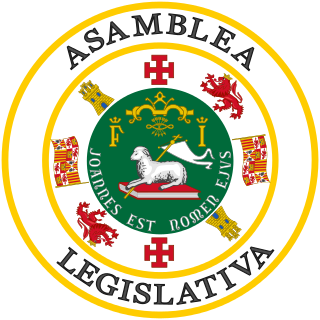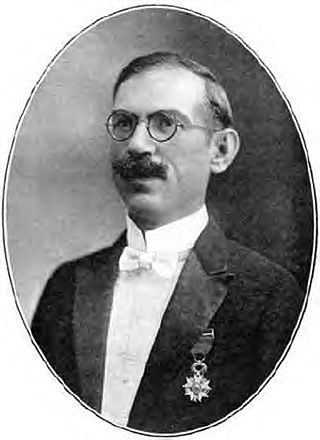Related Research Articles

Puerto Rico, officially the Commonwealth of Puerto Rico, is a self-governing Caribbean archipelago and island organized as an unincorporated territory of the United States under the designation of commonwealth. Located about 1,000 miles (1,600 km) southeast of Miami, Florida, between the Dominican Republic in the Greater Antilles and the U.S. Virgin Islands in the Lesser Antilles, it consists of the eponymous main island and numerous smaller islands, including Vieques, Culebra, and Mona. With approximately 3.2 million residents, it is divided into 78 municipalities, of which the most populous is the capital municipality of San Juan, followed by those within the San Juan metropolitan area. Spanish and English are the official languages of the government, though Spanish predominates.

The politics of Puerto Rico take place in the framework of a democratic republic form of government that is under the jurisdiction and sovereignty of the United States Congress as an organized unincorporated territory. Since the 1898 invasion of Puerto Rico by the United States during the Spanish–American War, politics in Puerto Rico have been significantly shaped by its status as territory of the United States. The nature of Puerto Rico's political relationship with the United States is the subject of ongoing debate in Puerto Rico, in the United States, the United Nations and the international community, with all major political parties in the archipelago calling it a colonial relationship.

José Celso Barbosa Alcala was a Puerto Rican physician, sociologist and political leader. Known as the father of the statehood movement in Puerto Rico, Barbosa was the first Puerto Rican, and one of the first persons of African descent to earn a medical degree in the United States.

The Puerto Rican Independence Party is a social-democratic political party in Puerto Rico that campaigns for the independence of Puerto Rico from the United States.

José de Diego y Martínez was a Puerto Rican statesman, journalist, poet, lawyer, and advocate for Puerto Rico's political autonomy in union with Spain and later of Puerto Rican independence from the United States who was referred to by his peers as "The Father of the Puerto Rican Independence Movement".

Throughout the history of Puerto Rico, its inhabitants have initiated several movements to gain independence for the island, first from the Spanish Empire between 1493 and 1898 and since then from the United States. Today, the movement is most commonly represented by the flag of the Grito de Lares(Cry of Lares) revolt of 1868.

Antonio Rafael Barceló y Martínez was a Puerto Rican lawyer, businessman and the patriarch of what was to become one of Puerto Rico's most prominent political families. Barceló, who in 1917 became the first President of the Senate of Puerto Rico, played an instrumental role in the introduction and passage of legislation which permitted the realization of the School of Tropical Medicine and the construction of a Capitol building in Puerto Rico.

The Senate of Puerto Rico is the upper house of the Legislative Assembly of Puerto Rico, the territorial legislature of Puerto Rico. The Senate, together with the House of Representatives of Puerto Rico, control the legislative branch of the government of Puerto Rico.

The Legislative Assembly of Puerto Rico is the territorial legislature of the Commonwealth of Puerto Rico, responsible for the legislative branch of the government of Puerto Rico. The Assembly is a bicameral legislature consisting of an upper house, the Senate normally composed of 27 senators, and the lower house, the House of Representatives normally consisting of 51 representatives. Eleven members of each house are elected at-large rather than from a specific legislative district with all members being elected for a four-year term without term limits.

The Jones–Shafroth Act – also known as the Jones Act of Puerto Rico, Jones Law of Puerto Rico, or as the Puerto Rican Federal Relations Act of 1917 – was an Act of the United States Congress, signed by President Woodrow Wilson on March 2, 1917. The act superseded the Foraker Act and granted U.S. citizenship to anyone born in Puerto Rico on or after April 11, 1899. It also created the Senate of Puerto Rico, established a bill of rights, and authorized the election of a Resident Commissioner to a four-year term. The act also exempted Puerto Rican bonds from federal, state, and local taxes regardless of where the bondholder resides.

Corsican immigration to Puerto Rico resulted in the 19th century from widespread economic and political changes in Europe that made life difficult for the peasant and agricultural classes in Corsica and other territories. The Second Industrial Revolution drew more people into urban areas for work, widespread crop failure resulted from long periods of drought, and crop diseases, and political discontent rose. In the early nineteenth century, Spain lost most of its possessions in the so-called "New World" as its colonies won independence. It feared rebellion in its last two Caribbean colonies: Puerto Rico and Cuba. The Spanish Crown had issued the Royal Decree of Graces of 1815 which fostered and encouraged the immigration of European Catholics, even if not of Spanish origin, to its Caribbean colonies.

The Socialist Party, also known as Socialista Obrero, was a pro-statehood political party in Puerto Rico, that also contemplated independence in the case that entry into the American Union was denied by Congress. The party was concerned with improving the social welfare of Puerto Ricans.

The political party strength in Puerto Rico has been held by different political parties in the history of Puerto Rico. Today, that strength is primarily held by two parties, namely:

The Puerto Rico statehood movement aims to make Puerto Rico a state of the United States. Puerto Rico is an unincorporated territorial possession of the United States acquired in 1898 following the Spanish–American War, making it "the oldest colony in the modern world". As of 2023, the population of Puerto Rico is 3.2 million, around half the average state population and higher than that of 19 U.S. states. Statehood is one of several competing options for the future political status of Puerto Rico, including: maintaining its current status, becoming fully independent, or becoming a freely associated state. Puerto Rico has held seven referendums on the topic since 1967, and four since 2012. They are non-binding, as the power to grant statehood lies with the US Congress.

Cayetano Coll y Cuchí was a politician, writer and an advocate of Puerto Rican Independence. In 1917, he became the first President of Puerto Rico House of Representatives after the island was ceded to the United States by Spain as a result of the Spanish–American War. Coll y Cuchí was a member of a prominent family of Puerto Rican politicians, writers and educators.
A referendum on the political status of Puerto Rico was held in Puerto Rico on November 6, 2012. It was the fourth referendum on status to be held in Puerto Rico. Puerto Rico has been an unincorporated territory of the United States since the Spanish–American War in 1898.

Proposed political status for Puerto Rico includes various ideas for the future of Puerto Rico, and there are differing points of view on whether Puerto Rico's political status as a territory of the United States should change.

A referendum of the status of Puerto Rico was held on November 3, 2020, concurrently with the general election. The Referendum was announced by Puerto Rico Governor Wanda Vázquez Garced on May 16, 2020. This was the sixth referendum held on the status of Puerto Rico, with the previous one having taken place in 2017. This was the first referendum with a simple yes-or-no question, with voters having the option of voting for or against becoming a U.S. state. The New Progressive Party (PNP), of whom Vázquez is a member, supports statehood, while the opposition Popular Democratic Party (PDP) and Puerto Rican Independence Party (PIP) oppose it.

Teodoro Vidal Santoni (1923–2016) was a Puerto Rican government official, art historian, and folklorist who collected Puerto Rican art. His donation of objects to the Smithsonian Institution in 1997 remains the largest donation from a single donor.

Marissa Jiménez Santoni is a Puerto Rican politician serving as a member of the Senate of Puerto Rico for district VIII.
References
- ↑ Elecciones 1917 Archived March 27, 2012, at the Wayback Machine on Pomarrosa
- ↑ Clark, Truman; Puerto Rico and the United States, 1917-1933, p. 187